Humility
SEARCH BY TITLE
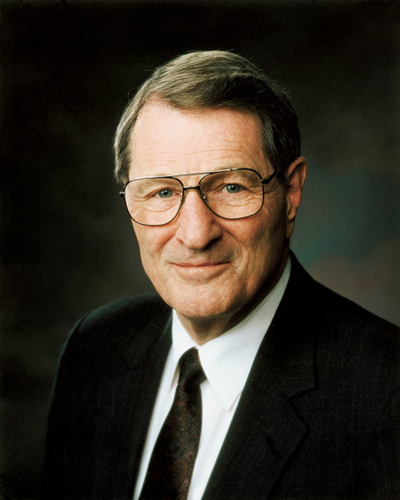 Becometh As a Child
Becometh As a Child
Inspired children often show the way through the wilderness. One reason they are able to do so is implicit in the searching question asked by King Benjamin: “For how knoweth a man the master whom he has not served, and who is a stranger unto him, and is far from the thoughts and intents of his heart?”. Children often have the “thoughts and [the] intents of [their] hearts” focused on the Master. Though not full of years, such children are full of faith! Too young for formal Church callings, they have been “called to serve” as exemplifiers, doing especially well when blessed with “goodly parents”. Just as the scriptures assure, “little children do have words given unto them many times”. For example, the resurrected Jesus revealed things to the Nephite children, who then taught adults and their parents “even greater” things than Jesus had taught. . . Brothers and sisters, no wonder the divine direction is for each of us to “becometh as a child”. Such saintliness will sustain us as we cross our Sinai, including in those moments when we must “be still, and know that I am God”. Such submissive stillness is necessary, because the process of consecration is not one of explanation. Only “after the trial of [our] faith” does the full witness come; meanwhile, often “a little child shall lead [us]”.
![ArtBook__134_134__EzraTaftBenson____[1]](http://ldsminds.com/wp-content/uploads/2013/10/ArtBook__134_134__EzraTaftBenson____1-e1403389404661.jpg) Beware of Pride
Beware of Pride
The antidote for pride is humility—meekness, submissiveness. It is the broken heart and contrite spirit. As Rudyard Kipling put it so well: The tumult and the shouting dies; The captains and the kings depart. Still stands thine ancient sacrifice, An humble and a contrite heart. Lord God of Hosts, be with us yet, Lest we forget, lest we forget. God will have a humble people. Either we can choose to be humble or we can be compelled to be humble. Alma said, “Blessed are they who humble themselves without being compelled to be humble.” Let us choose to be humble. We can choose to humble ourselves by conquering enmity toward our brothers and sisters, esteeming them as ourselves, and lifting them as high or higher than we are. We can choose to humble ourselves by receiving counsel and chastisement. We can choose to humble ourselves by forgiving those who have offended us. We can choose to humble ourselves by rendering selfless service. We can choose to humble ourselves by going on missions and preaching the word that can humble others. We can choose to humble ourselves by getting to the temple more frequently. We can choose to humble ourselves by confessing and forsaking our sins and being born of God. We can choose to humble ourselves by loving God, submitting our will to His, and putting Him first in our lives. Let us choose to be humble. We can do it. I know we can. My dear brethren and sisters, we must prepare to redeem Zion. It was essentially the sin of pride that kept us from establishing Zion in the days of the Prophet Joseph Smith. It was the same sin of pride that brought consecration to an end among the Nephites. Pride is the great stumbling block to Zion. I repeat: Pride is the great stumbling block to Zion. We must cleanse the inner vessel by conquering pride. We must yield “to the enticings of the Holy Spirit,” put off the prideful “natural man,” become “a saint through the atonement of Christ the Lord,” and become “as a child, submissive, meek, humble.”
![ArtBook__134_134__EzraTaftBenson____[1]](http://ldsminds.com/wp-content/uploads/2013/10/ArtBook__134_134__EzraTaftBenson____1-e1403389404661.jpg) Cleansing the Inner Vessel
Cleansing the Inner Vessel
The great and spacious building which Lehi saw was the pride of the world where the multitude of the earth was gathered. Those who walked the straight and narrow path and held onto the word of God and partook of the love of God were mocked and scorned by those in the building. “The humble followers of Christ” are few. Pride does not look up to God and care about what is right. It looks sideways to man and argues who is right. Pride is manifest in the spirit of contention. Was it not through pride that the devil became the devil? Christ wanted to serve. The devil wanted to rule. Christ wanted to bring men to where He was. The devil wanted to be above men. Christ removed self as the force in His perfect life. It was not my will, but thine be done. Pride is characterized by “What do I want out of life?” rather than by “What would God have me do with my life?” It is self-will as opposed to God’s will. It is the fear of man over the fear of God. Humility responds to God’s will—to the fear of His judgments and the needs of those around us. To the proud, the applause of the world rings in their ears; to the humble, the applause of heaven warms their hearts. . . The two groups in the Book of Mormon that seemed to have the greatest difficulty with pride are the “learned, and the rich.” But the word of God can pull down pride. With pride, there are many curses. With humility, there come many blessings. For example, “Be thou humble; and the Lord thy God shall lead thee by the hand, and give thee answer to thy prayers.” The humble will “be made strong, and blessed from on high, and receive knowledge.” The Lord is “merciful unto those who confess their sins with humble hearts.” Humility can turn away God’s anger. My beloved brethren and sisters, as we cleanse the inner vessel, there will have to be changes made in our own personal lives, in our families, and in the Church. The proud do not change to improve, but defend their position by rationalizing. Repentance means change, and it takes a humble person to change. But we can do it. We have made some wonderful strides in the past. We will be lengthening our stride in the future. To do so, we must first cleanse the inner vessel by awaking and arising, being morally clean, using the Book of Mormon in a manner so that God will lift the condemnation, and finally conquering pride by humbling ourselves.
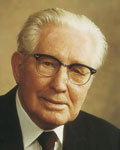 The Currant Bush
The Currant Bush
You sometimes wonder whether the Lord really knows what he ought to do with you. You sometimes wonder if you know better than he does about what you ought to do and ought to become. I am wondering if I may tell you a story that I have told quite often in the Church. It is a story that is older than you are. It’s a piece out of my own life, and I’ve told it in many stakes and missions. It has to do with an incident in my life when God showed me that he knew best. . . I arose from my knees a humble man. And now, almost fifty years later, I look up to him and say, “Thank you, Mr. Gardener, for cutting me down, for loving me enough to hurt me.” I see now that it was wise that I should not become a general at that time, because if I had I would have been senior officer of all western Canada, with a lifelong, handsome salary, a place to live, and a pension when I’m no good any longer, but I would have raised my six daughters and two sons in army barracks. They would no doubt have married out of the Church, and I think I would not have amounted to anything. I haven’t amounted to very much as it is, but I have done better than I would have done if the Lord had let me go the way I wanted to go.
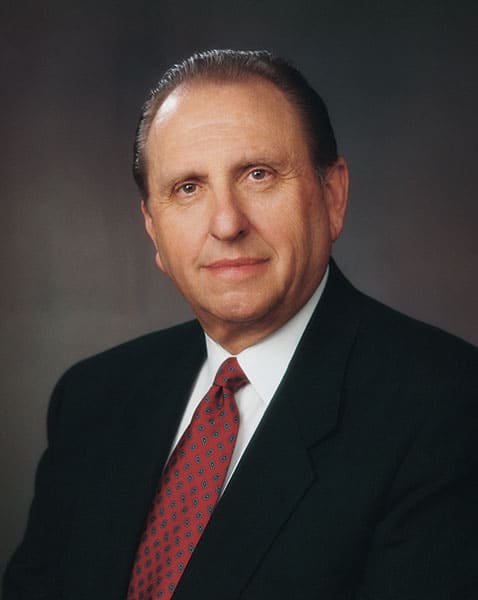 Let Him Be Humble
Let Him Be Humble
Some years ago I stood at a pulpit and noticed a little sign that only the speaker could see, and the words on that sign were these: “Who stands at this pulpit, let him be humble.” How I pray to my Heavenly Father that I might never forget the lesson I learned that day! I feel to thank my Heavenly Father for his many blessings to me. I am grateful to have been born of goodly parents, whose parents were gathered out of the lands of Sweden and Scotland and England by humble missionaries who through the bearing of their testimonies touched the spirits of these wonderful people. I am so grateful for my teachers and leaders in my boyhood and young manhood in a humble, pioneer ward in a humble, pioneer stake. I am grateful for my sweet companion and for the influence for good which she has had upon my life, and to her dear mother who had the courage in far-off Sweden to accept the gospel and to come to this country. I am so happy that the Lord has blessed us with three fine children, our youngest born to us in the mission field in Canada. I am grateful for these blessings. I am grateful for my friends and for O. Preston Robinson and my associates at the Deseret News with whom I have so closely worked these past fifteen years. I know that God lives, my brothers and sisters. There is no question in my mind. I know that this is his work, and I know that the sweetest experience in all this life is to feel his promptings as he directs us in the furtherance of his work. I have felt these promptings as a young bishop, guided to the homes where there was spiritual, or perhaps temporal, want. I felt it again in the mission field as I worked with your sons and your daughters — the missionaries of this great Church who are a living witness and testimony to the world that this work is divine and that we are led by a prophet. I think of a little sister, a French-Canadian sister, whose life was changed by the missionaries as her spirit was touched as she said good-bye to me and my wife two years ago in Quebec. She said, “President Monson, I may never see the prophet. I may never hear the prophet. But President, far better, now that I am a member of this Church, I can obey the prophet.”
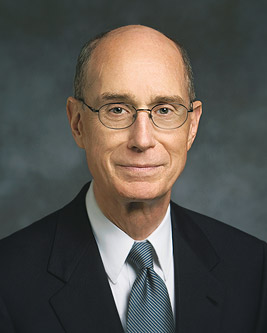 Our Hearts Knit As One
Our Hearts Knit As One
A second principle to guide our progress to become one is to be humble. Pride is the great enemy of unity. You have seen and felt its terrible effects. Just days ago I watched as two people—good people—began with a mild disagreement. It started as a discussion of what was true but became a contest about who was right. Voices became gradually louder. Faces became a little more flushed. Instead of talking about the issue, people began talking about themselves, giving evidence why their view, given their great ability and background, was more likely to be right. You would have felt alarm as I did. We have seen the life-destroying effects of such tragic conflict. You and I know people who left the fellowship of the Saints over injured pride. Happily I am seeing more and more skillful peacemakers who calm troubled waters before harm is done. You could be one of those peacemakers, whether you are in the conflict or an observer. One way I have seen it done is to search for anything on which we agree. To be that peacemaker, you need to have the simple faith that as children of God, with all our differences, it is likely that in a strong position we take, there will be elements of truth. The great peacemaker, the restorer of unity, is the one who finds a way to help people see the truth they share. That truth they share is always greater and more important to them than their differences. You can help yourself and others to see that common ground if you ask for help from God and then act. He will answer your prayer to help restore peace, as He has mine. That same principle applies as we build unity with people who are from vastly different backgrounds. The children of God have more in common than they have differences. And even the differences can be seen as an opportunity. God will help us see a difference in someone else not as a source of irritation but as a contribution. The Lord can help you see and value what another person brings which you lack. More than once the Lord has helped me see His kindness in giving me association with someone whose difference from me was just the help I needed. That has been the Lord’s way of adding something I lacked to serve Him better.
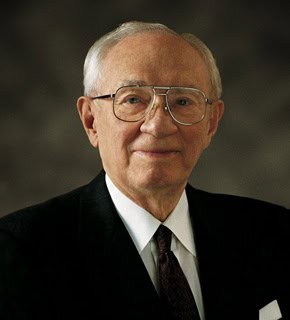 A Prophet’s Counsel and Prayer for Youth
A Prophet’s Counsel and Prayer for Youth
Be Humble. There is no place for arrogance in our lives. There is no place for conceit. There is no place for egotism. We have a great work to do. We have things to accomplish. We need direction in the pursuit of our education. We need help in choosing an eternal companion. The Lord has said, “Be thou humble; and the Lord thy God shall lead thee by the hand, and give thee answer to thy prayers”. What a tremendous promise is given in this statement. If we are without conceit and pride and arrogance, if we are humble and obedient, then the Lord will lead us by the hand and answer our prayers. What greater thing could we ask for? There is nothing to compare with this. The Savior, in the great Sermon on the Mount, declared, “Blessed are the meek: for they shall inherit the earth”. I believe the meek and the humble are those who are teachable. They are willing to learn. They are willing to listen to the whisperings of the still, small voice for guidance in their lives. They place the wisdom of the Lord above their own wisdom.
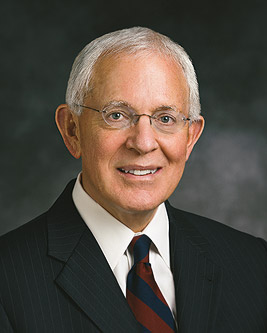 To Walk Humbly with Thy God
To Walk Humbly with Thy God
To begin, it should come as no surprise that, in the estimation of some, humility ranks quite low on the scale of desirable character traits. Popular books have been written in recent years on integrity, common sense, civility, and a host of other virtues, but apparently there is little market for humility. Obviously, in these coarsening times when we are taught the art of negotiating by intimidation, and assertiveness has become a byword of the business world, those seeking to become humble will be a small and overlooked but critically important minority. Consciously trying to acquire humility is also problematic. I remember once hearing one of my colleagues in the Seventy say about humility that “if you think you have it, you don’t.” He suggested we should try to develop humility and be sure we didn’t know when we got it, and then we would have it. But if we ever thought we had it, we wouldn’t. . . . Fortunately, the Savior has given us a model for developing humility. When His disciples approached Him and inquired, “Who is the greatest in the kingdom of heaven?” He responded by placing a little child in their midst and stating, “Whosoever … shall humble himself as this little child, the same is greatest in the kingdom of heaven.”
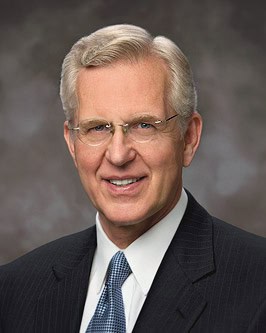 When Thou Art Converted
When Thou Art Converted
How can you become converted? How can you make the gospel of Jesus Christ not just an influence in your life but the controlling influence and, indeed, the very core of what you are? The ancient prophet Jeremiah spoke of the law of God, the gospel, being written in our hearts. He quotes the Lord speaking about us, His people in the latter days: “I will put my law in their inward parts, and write it in their hearts; and will be their God, and they shall be my people.” Do you want this for yourself? I can tell you how that can happen, but it must be something you want. The gospel cannot be written in your heart unless your heart is open. Without a heartfelt desire, you can participate in sacrament meetings, classes, and Church activities and do the things I will tell you, but it won’t make much difference. But if your heart is open and willing, like the heart of a child, let me tell you what you can do to be converted. As a first step, you must lay aside any feeling of pride that is so common in the world today. By this I mean the attitude that rejects the authority of God to rule in our lives. This attitude was described by the Lord to Joseph Smith when He said, “They seek not the Lord to establish his righteousness, but every man walketh in his own way, and after the image of his own god.” You hear it expressed today in phrases such as “Do your own thing” or “Right and wrong depend on what I feel is right for me.” That attitude is a rebellion against God, just as Lucifer rebelled against God in the premortal world. He rejected God’s right to declare the truth and establish the law. Satan wanted, and still wants, the power to declare arbitrarily what is right and wrong. Our beloved Creator does not force us to accept His authority, but willingly submitting to that authority is the first step in conversion.
